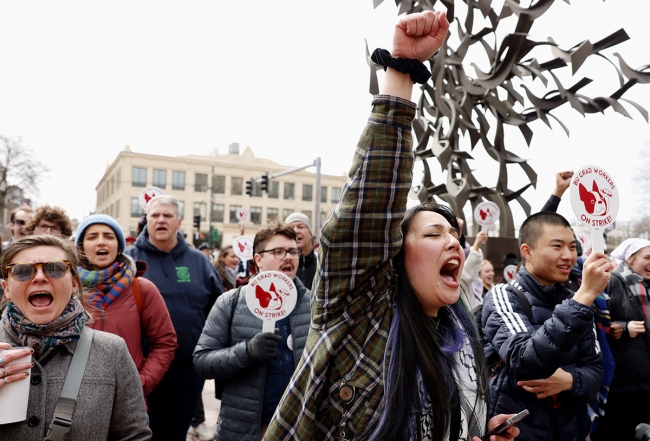You have /5 articles left.
Sign up for a free account or log in.

The Boston University graduate workers’ strike has been ongoing since March.
The Boston University Graduate Workers Union has been on strike since March 25. This week, the BUGWU walkout became the longest union-authorized work stoppage among U.S. college or university student employees in at least a decade, according to data from the National Center for the Study of Collective Bargaining in Higher Education and the Professions.
At over 150 days, the BU work stoppage has now taken the record from the University of Michigan grad student instructors and staff assistants, who went on strike for about 147 days between March and August 2023. (A 2019–20 strike by grad workers at the University of California, Santa Cruz, may have lasted slightly longer than both, but it was a wildcat strike—meaning it wasn’t backed by a union.)
The lengthy strikes underline how active unions, and particularly student unions, have become in higher education. The National Center, based at the City University of New York’s Hunter College, previously reported that student worker bargaining units—including both undergraduate and the much more common grad units—increased in number by 54 percent between January 2022 and July 2023. In the year since, elite private institutions and other colleges and universities have continued to see their grad workers unionize.
The BU grad student workers voted to form a union in December 2022, but they are still fighting to reach their first contract with the university. The strike began after eight months of negotiations, and the walkout has now lasted nearly five months. With fall classes scheduled to begin Sept. 3, the strike is now set to disrupt another semester—unless the two sides can reach a deal soon.
Ongoing Negotiations
During the spring semester, the strike interfered with teaching and the delivery of final grades, though it’s unclear to what extent. The walkout initially drew coverage by the national media, which zeroed in on the recommendation by arts and sciences dean Stan Sclaroff that faculty members use artificial intelligence to manage course discussions, labs and student feedback amid the strike. Critics accused the university of trying to replace grad workers with AI.
In March and April, the union filed unfair labor practice charges against the university, alleging, among other things, that an associate dean harassed and chased workers who were peacefully delivering fliers, and that personal items were stolen from grad workers’ locked offices.
Colin Riley, a university spokesperson, said “there’s no merit to” the charges.
The media coverage died down as the strike dragged on, and by some accounts, the strike did, too. On April 29, near the end of the spring semester, then-provost Kenneth Lutchen sent a message to the university community suggesting the work stoppage had mostly petered out.
“The scope and impact of the strike has waned, as more and more BUGWU members have chosen to return to work,” Lutchen wrote. “At this point, over 80 percent of the students in the unit are back to work.”
He added that only a small fraction of them were attending BUGWU membership meetings, and roughly 175 students out of the 3,300-person unit had voted to continue the strike.
Neither BUGWU members nor spokespeople for Service Employees International Union Local 509, of which the grad workers union is a part, told Inside Higher Ed what percentage of grad workers were withholding their labor as of April 29 or during the summer; one BUGWU member said even the size of the union’s represented bargaining unit is in dispute. But they acknowledged the walkout continues, and the union hasn’t called it off.
“The strike is ongoing and will be ongoing until membership votes to end the strike,” said Nive Senthilvel, a union member and an incoming third-year Ph.D. student in the history department. Senthilvel said she thinks 17 grad workers were eligible to strike in her department, and 15 have been striking since March. “It’s been a long time since we’ve been paid,” she said, “and all of us would love to be back in the classroom, but the priority and the goal is getting a strong contract.”
Union leaders are gearing up for a fight in the fall.
“We’re preparing to have all hands on deck for a fall strike, should that be necessary,” said Meiya Sparks Lin, a member of BUGWU’s bargaining team and an incoming third-year Ph.D. student in the English department. “Instead of working with us to try to solve the problems at BU and work towards the education that BU promises, we’ve been met with hostility and intimidation, and that’s precisely the reason why the strike has dragged on for so long.”
Whatever level of support remains for the strike, the university, now led by a new president and a new provost, did shift its position earlier this month.
Last-Minute Offers
Maddie Conway, an SEIU Local 509 spokesperson, said the university’s grad workers currently make between $27,000 and $40,000 a year, and BUGWU previously proposed a minimum annual stipend of about $58,100.
On Aug. 7, BU’s new provost, Gloria Waters, posted an update on the university’s website promising the union an annual minimum stipend for doctoral students of $45,000, plus 3 percent annual raises over a five-year contract that would bring that figure to about $50,600 by the end. Sparks Lin said the concession demonstrated the strike is working but noted that about half the union’s members aren’t Ph.D. students.
And money isn’t the only issue; the union is also fighting for more support for international students, and for students facing discrimination and harassment. “If they don’t want us to continue pushing,” Sparks Lin said, “they need to show some movement.”
Bargaining continued Thursday afternoon. Still, there was no deal.




